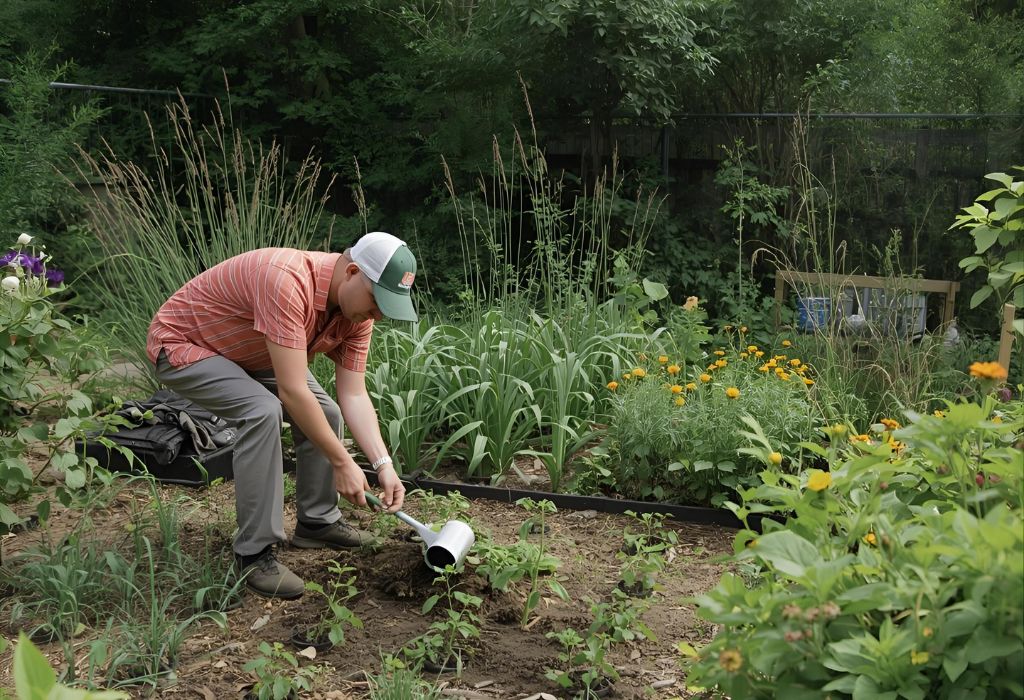You plant your vegetables and flowers with care, but within weeks, weeds begin to invade. Left unchecked, they can reduce garden yields by more than 30–50% and rob your plants of water, nutrients, and sunlight. On average, home gardeners spend 20–30 minutes a day weeding, with longer weekend sessions during peak growing seasons.
Weeds aren’t just unsightly—they are the biggest competitor your plants face. But with the right strategies, you can control them naturally and even prevent them from returning. This guide shows you step by step how to keep weeds out of your garden using proven, eco-friendly methods that work in any climate.
I. What Are Garden Weeds?

A weed is simply a plant growing where it’s not wanted. Some grow fast, spread aggressively, and choke out the plants you want to nurture.
Common Types of Garden Weeds
- Annual Weeds – Complete their life cycle in one season (example: crabgrass, chickweed).
- Perennial Weeds – Regrow year after year from roots or runners (example: dandelion, bindweed).
- Invasive Weeds – Spread rapidly and dominate large areas (example: knotweed, couch grass).
Why They Are Harmful
- Steal nutrients, water, and sunlight from crops and flowers
- Reduce harvest yields significantly
- Attract pests and harbor plant diseases
- Make gardens appear messy and neglected
II. Why Do Weeds Grow in Gardens?
- Disturbed soil brings dormant seeds to the surface.
- Sunlight and moisture on bare soil trigger rapid germination.
- Seeds spread through wind, pets, birds, and even clothing.
- Soil seed banks can store viable weed seeds for up to 5–10 years.
Pro Tip: The more bare soil you leave, the more weeds will find their way in.
III. Natural Methods to Keep Weeds Out

1. Mulching
- Blocks sunlight and smothers weed seeds.
- Organic mulch: straw, wood chips, shredded leaves.
- Inorganic mulch: gravel, plastic sheeting, landscape fabric.
- Best applied 2–3 inches thick.
2. Dense Planting
- Tight spacing shades soil, giving weeds little chance to sprout.
3. Ground Covers
- Creeping thyme, clover, or other low plants form living weed barriers.
4. Soil Solarization
- Cover moist soil with clear plastic for 4–6 weeks in hot months—this heat treatment kills seeds in the topsoil.
5. Hand-Pulling & Hoeing
- Most effective when weeds are small.
- Pull weeds after rain for easier root removal.
6. Natural Sprays
- Boiling water – kills weeds instantly in cracks.
- Vinegar sprays – burn foliage, best for paths not garden beds.
- Salt solutions – use sparingly on driveways, never in garden soil.
IV. Preventing Weeds Before They Start
- Use landscape fabric under mulch to block germination.
- Plant in raised beds or containers to reduce weed invasion.
- Rotate crops yearly in vegetable gardens to break cycles.
- Plant cover crops like rye or clover to enrich soil and suppress weeds.
Pro Tip: Preventing weeds is easier, faster, and cheaper than removing them later.
V. Smart Gardening Practices

- Water with drip irrigation to target plant roots, not weeds.
- Fertilize correctly—avoid overfeeding which encourages weed growth.
- Maintain clean edges so grass and creeping weeds don’t invade beds.
VI. Eco-Friendly Weed-Control Alternatives
- Homemade weed sprays made with vinegar and dish soap.
- Flame weeding for driveways and walkways.
- Corn gluten meal as a natural pre-emergent that blocks seeds from sprouting.
VII. Mistakes to Avoid

- Over-tilling soil, which exposes hidden weed seeds.
- Allowing weeds to flower and spread seeds.
- Using contaminated mulch or compost.
- Relying too much on chemical herbicides, which damage soil health long term.
VIII. Seasonal Weed Control
- Spring – Apply mulch early before weeds emerge.
- Summer – Hand-pull weekly and refresh mulch layers.
- Fall – Plant cover crops or spread compost to block winter weeds.
- Winter – Clean beds thoroughly to reduce early-spring sprouts.
IX. FAQs: Weed Control
- What kills weeds permanently?
A combination of mulching, ground covers, and regular maintenance. - Can vinegar kill weeds?
Yes, but it works best on small weeds and non-garden areas. - How do I prevent weeds naturally?
Keep soil covered, rotate crops, and use mulch effectively. - Is mulch enough?
Mulch works best when applied thick and refreshed yearly. - How often should I weed?
Weekly during growing season to stop them from spreading.
X. Statistics Every Gardener Should Know

- Uncontrolled weeds can slash yields by 30–50%, depending on crop type.
- Gardeners spend an average of 120+ hours per year on weeding.
- A single dandelion can produce up to 15,000 seeds, many viable for years.
- Mulching reduces weed growth by up to 80% when done correctly.
- Cover crops reduce weed pressure by 50% or more in vegetable gardens.
Conclusion
Weeds may be persistent, but they’re not unbeatable. With the right prevention methods—mulching, dense planting, cover crops, and smart watering—you can cut your weeding time drastically while keeping your garden healthy.
Think of weed control as a long-term strategy: the more consistently you cover your soil and manage growth cycles, the fewer weeds you’ll fight year after year. A little effort now saves countless hours later, leaving you with a thriving, weed-free garden.
I’m Maya L. Greenwood, a lifelong plant lover who believes anyone can grow something beautiful with the right guidance. After years of testing soil mixes, pruning methods, irrigation tricks, and pest-safe solutions, I started EasyGardenTips.com to turn hard-won lessons into step-by-step advice. From seed starting and container gardens to composting and seasonal checklists, my goal is to make gardening simple, sustainable, and fun.
